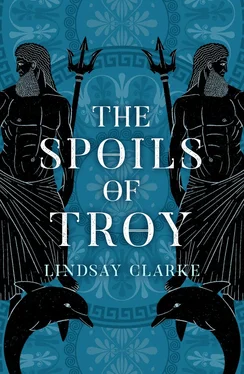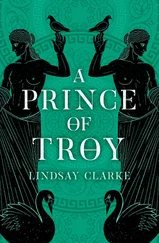Nauplius made as if to answer, then seemed to change his mind, shaking his head at the immense burden of what he had to utter. ‘I have sailed far today,’ he sighed, ‘and my heart is heavy with evil tidings. Let me first rest a while and regain my strength. Then we shall speak of the grief that this war has brought to us.’ Nodding with the absolute authority of a sovereign who had decided that everything that needed to be said for the time being had now been said, he turned away, raising a ringed hand to his body-servant for support.
‘Of course,’ Penelope answered uneasily. ‘My steward will escort you to your chamber. But first … Forgive me, but I must ask you, Lord Nauplius …’
Frowning, the old king tilted his head to look back at her. Penelope forced herself to speak. ‘Do you have word of my husband?’ She saw how one flinty eye was narrower than the other and its lid quivered like a moth beneath its brow. Into a silence that had gone on too long she said, ‘Does Odysseus live?’
Nauplius drew in his breath and stood with his mottled head nodding still.
‘Oh yes,’ the voice was barely more than a hoarse wheeze, ‘Odysseus lives still. Odysseus lives.’ And again, with a sigh that seemed to rebuke the relief that broke visibly across her face, he turned away.
When Nauplius and his attendants had left the hall, Amphinomus approached Penelope, smiling. ‘Good news at last, my lady.’
‘Yes.’ Penelope stood with the fingertips of her right hand at her cheek. ‘But I fear that Nauplius has more to say,’
Amphinomus shrugged. ‘It may only be that his grief has darkened his view of things. You mustn’t let his shadow dim your own fair light.’
Penelope shook her head. ‘The truth is that I didn’t greatly care for Palamedes. He was a clever man, in some ways as clever as Odysseus, but he lacked warmth. And I have often wished that he had never set foot on this island. If he hadn’t come here with Menelaus all those years ago, Telemachus would have a father to watch over him and I a husband in my bed. Yet one must pity any man who has lost his son.’
‘One must indeed,’ Amphinomus pursed his lips, ‘even though he brings a deathly chill into the hall with him!’
Penelope reproved the arch smile in the young man’s handsome face. ‘It wouldn’t surprise me to learn that the King of Euboea sickens from more than grief. Also he is as much a guest of the house as you are, sir. We will be civil with him.’ But she was glad of her friend’s company in what threatened to be a difficult and demanding time.
Her apprehensions were confirmed at dinner that evening when Nauplius merely frowned in response to Penelope’s warmly expressed hope that he was well rested, and then went on to express his surprise that a young woman of the royal house of Sparta had not long since grown discontented with the dull round of life in rustic Ithaca.
‘I regret that our plain ways are not to your taste,’ Penelope answered. ‘I myself have always found the simple life here wonderfully refreshing after the rivalries and gossip of the court in Sparta. With each day that passes I learn to love this island and its people more.’ Nor did she entirely conceal the reproach in her voice as she added, ‘Indeed I sometimes think that were all the world to emulate such dullness, it might be a happier and more peaceful place.’
‘Your husband has been gone for nearly ten years, madam,’ Nauplius replied. ‘Have those years not taught you that happiness and peace are not to be found anywhere for long?’
Penelope shrugged her delicate shoulders. ‘I respect the wisdom of your years, my lord, but it may be that Ithaca has something to teach you still.’
‘However,’ Amphinomus put in, ‘we are all eager for news of the war, and not much reaches us here. Will you share with us what you know of its progress?’
‘Troy still stands,’ Nauplius glowered. ‘Men fight beneath its walls and die, and it would seem that Agamemnon and Achilles are fiercer in their quarrels with each other than they are with the Trojans. Meanwhile prudent counsel is ignored and honest men are traduced by liars. In short, the Argive army is led by knaves and fools. What more is there to say?’ Undismayed by the flush he had brought to Penelope’s face, he looked away.
Amphinomus said quietly, ‘I think you forget that Lord Odysseus is among those who command the host.’
‘No, sir, I do not forget,’ Nauplius answered shortly.
From further down the table Lord Mentor, whom Odysseus had entrusted with the management of his affairs on Ithaca uttered a low growl. ‘Then you will except him from your remarks, I trust?’
But either Nauplius did not hear him or affected not to have done so. He took a trial sip from his wine-cup, wrinkled his nostrils in a barely concealed grimace of disappointment, and smiled at Penelope. ‘Our Euboean vintage is mellower, my dear. I must make a point of sending you some.’
Her voice uncharacteristically tense, Penelope said, ‘My husband is no man’s fool, sir. Do you suggest he is a knave?’
Nauplius opened his hands in a mild gesture of protest. ‘You were daughter to my old friend Icarius long before you became wife to Odysseus. Believe me, I have no desire to say anything that would cause you pain or displeasure.’
Aware that the answer was neither a withdrawal nor an apology, Penelope made an effort to still her breathing. If she had suspected earlier that this dour old man had come with mischief at work in his embittered mind, she was convinced of it now. Looking for space to gather her thoughts, she turned to Amphinomus. ‘Did you not ask Phemius to sing for you tonight? Perhaps his voice will please our royal guest?’
And so I was required to stand before this uneasy table and raise my voice in the silence. I had been looking forward to this moment all day but any bard will tell you that few can sing at their best before those whose minds are elsewhere. My ambition had been to sing from The Lay of Lord Odysseus on which I had been working, and in the circumstances it would have been the courageous thing to do. But I was reluctant to expose a still raw and tender talent before a judge as stern as King Nauplius, so I chose instead to sing some of the traditional goat-songs sung by shepherds on the island. Amphinomus and Lady Penelope received them warmly enough, but those bucolic airs appealed no more to the visiting king’s ears than our island’s wine had done to his palate.
‘My son told me that you liked to keep a simple life here on Ithaca,’ he said dryly, ‘but I’m surprised to find that the court of Laertes lacks a bard even!’
‘The boy’s father is our bard,’ Penelope answered quietly. ‘There is some fear that his life was lost at sea after the Mysian campaign.’
‘A campaign against which my own son strongly advised,’ Nauplius said with narrowed eyes, ‘but other counsel was preferred, and with what disastrous results we may all now plainly see.’ Then he cast a searching look my way. ‘The boy sings sweetly enough,’ he conceded. ‘I hear the grief in his voice. It is hard for a son to lose a father, but it is in the natural course of things.’ Nauplius shook his gaunt head. ‘For a father to lose a son however …’
Amphinomus said, ‘Surely a father can take comfort from the knowledge that his son died honourably in battle?’
But Nauplius turned a cold stare on him. ‘My son was denied such honour. And denied it by those whom he had loyally sought to serve.’
The silence was broken by Lord Mentor. ‘As the king has observed,’ he said, ‘we are simple souls on Ithaca. Perhaps he will make his meaning plainer.’
Nauplius met the controlled anger with a bleak smile. ‘In good time,’ he said, ‘in good time. My business here is with the Lady Penelope. If she will grant me private audience when this meal is done, we will talk more of these things.’
Читать дальше












